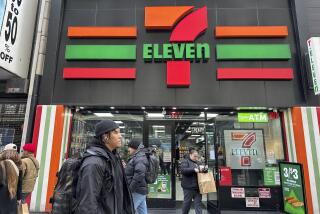J.C. Penney May Get an Offer
- Share via
J.C. Penney Co. shares rose more than 8% on Thursday on speculation that two investment firms have joined forces to bid for the 100-year-old retail icon.
An acquisition of the nation’s No. 2 department store chain would mark the third blockbuster retail deal this year. And with a purported price tag of as much as $18 billion, a sale of Penney would be the second-largest leveraged buyout ever.
Women’s Wear Daily, considered the bible of the retail industry, reported Thursday that Cerberus Capital Management and Carlyle Group were considering making an unsolicited offer for Plano, Texas-based Penney. Vanessa Castagna, now an executive at Cerberus, resigned as chairwoman and chief executive of Penney’s catalog and Internet division in November after being passed over to replace departing CEO Allen Questrom.
Penney declined to comment on the report, but indicated in a statement that it had no great desire to be acquired. The company said CEO Myron Ullman would discuss a long-range plan at a two-day meeting with analysts later this month.
The plan “lays out a strong set of goals and strategies for taking J.C. Penney to a leadership position in the retail industry and will deliver value to our investors,” the company said.
Clearly excited about the possibility of a sale, investors sent Penney shares to a 52-week high of $53.44 on the New York Stock Exchange. They closed up $4.02 at $51.92.
Penney has more than 1,000 stores in the 50 states and Puerto Rico, including 71 in California, where it employs 10,000 people.
Unlike Federated Department Stores Inc.’s planned purchase of May Department Stores Co., an acquisition of Penney by an investor group probably would not have sweeping implications for Southern California mall owners, retail experts said Thursday.
The $11-billion Federated-May union probably would prompt store closures because Cincinnati-based Federated, which operates the Macy’s and Bloomingdale’s chains, and St. Louis-based May, which owns the Robinsons-May chain, have overlapping stores in 28 Southland malls.
Consolidation has been sweeping the retail industry amid fierce competition among the major chains. Last month, Kmart Holding Corp. bought Sears, Roebuck & Co. for $12.3 billion. And on Thursday, Saks Inc.’s shares jumped after news reports circulated that the Birmingham, Ala.-based retailer might sell its mid-price department stores and its tony Saks Fifth Avenue chain.
Saks declined to comment, but its stock hit a 52-week high of $18.40 before closing at $18.05, up $1.50 or 9%, on the New York Stock Exchange.
New York-based Cerberus and its affiliates manage funds and accounts in excess of $14 billion. Named after the mythological three-headed dog that guards the gates of hell, Cerberus often invests in struggling retailers, including Wherehouse Entertainment Inc. and Esprit Holdings Ltd. It was part of an investment consortium that last year bought Hayward, Calif.-based Mervyn’s from Target Corp. in Minneapolis for $1.65 billion and is part of a group that made an unsuccessful attempt to buy Toys R Us Inc. for about $5 billion in February.
In a leveraged buyout, buyers finance the acquisition with debt guaranteed by the assets of the target company, putting little of their own money at risk.
Castagna, who had been second in command at Penney, joined Cerberus last month to oversee its Mervyn’s stores. When her resignation was announced, former CEO Questrom credited her with helping to navigate Penney’s turnaround, saying she played a pivotal role in improving its merchandise, stores and operations and in building a strong management team.
Washington-based Carlyle Group is one of the world’s largest investment firms with more than $25 billion under management. The firm announced this week that it had raised $10 billion to fund new buyout investments in the United States and Europe.
Penney is one of the oldest and best-known names in retailing. The company’s roots date to 1902 when James Cash Penney opened the Golden Rule dry goods and clothing store in the mining and farming town of Kemmerer, Wyo.
The retailer spent its early years building its name in small markets, just as Bentonville, Ark.-based Wal-Mart Stores Inc. would do a half-century later. Penney eventually stretched itself across the nation, moving first into cities and then into suburban malls.
Like competitors Sears and the defunct Montgomery Ward chain, Penney was a pioneer of money-back returns and standardized pricing in an era when customers who bought shoddy products usually had little recourse. Penney also helped blaze trails in the creation of private-label store brands including the Big Mac work-clothes line that is still sold today.
In later years, Penney was buffeted by competition, along with other lower- and mid-priced department stores. After pushing its profit to more than $1 billion in 1995, the retailer lost $705 million in 2001.
In 2000, J.C. Penney launched a five-year turnaround plan that focused in large part on cutting expenses while improving its merchandise, stores and marketing, an effort that’s been paying off.
The company has posted increases in same-store sales for the last two years, spokesman Quinton Crenshaw said, and earnings have exceeded expectations for about the last year. Same-store sales are an important indicator of a retailer’s health because they include only stores open at least a year.
Times wire services were used in compiling this report.
More to Read
Inside the business of entertainment
The Wide Shot brings you news, analysis and insights on everything from streaming wars to production — and what it all means for the future.
You may occasionally receive promotional content from the Los Angeles Times.











